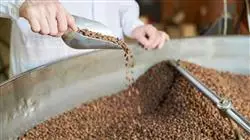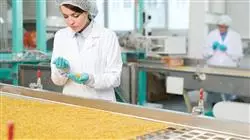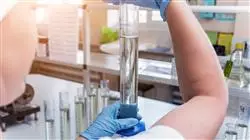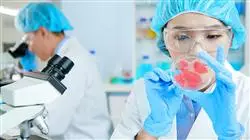University certificate
The world's largest faculty of nutrition”
Introduction to the Program
Do not miss this great opportunity and become a prestigious nutritionist who is able to successfully employ analytical techniques in quality control"

Quality control of processes and products is essential to ensure food safety and to guarantee Good Manufacturing and Elaboration Practices (GMP) in the processes carried out in the food industry. For this reason, the Analytical and Instrumental Techniques module highlights the tools that guarantee food safety, which are mandatory and under the responsibility of the producers, either by controls of the food industry's own laboratories or by outsourcing the service to food and reference laboratories for the control of raw materials and products.
Moreover, R&D&I systems are presented in the development of new foods across the food industry that require new technologies, new processes and food safety systems that are increasingly specific and adapted to the characteristics of new foods. This program is the most complete among the different specializations offered by universities today, because it is oriented according to parameters of excellence, from the content to the teaching staff.
The teaching staff on this Postgraduate diploma are university professors and professionals from various disciplines in primary production, the use of analytical and instrumental techniques for quality control, the prevention of accidental and intentional contamination and fraud, food safety/food integrity and traceability (food defence and food fraud/food authenticity). They are experts in food legislation and regulations on quality and safety, validation of methodologies and processes, digitalization of quality management, research and development of new foods and finally, the coordination and execution of R&D&I projects. This educational project has been designed with the commitment to train qualified professionals in the field. A program devised by specialists in each specific subject, who meet new challenges every day and who are committed to preparing students for the future.
Applying quality controls in the creation of new foods is essential for their subsequent commercialization and consumption"
This Postgraduate diploma in Analytical Techniques in R&D&I Project Quality Control contains the most complete and up-to-date scientific program on the market. Its most notable features are:
- Case studies presented by experts in food safety at the nutritional level
- The graphic, schematic, and practical contents with which they are created, provide scientific and practical information on the disciplines that are essential for professional practice
- The latest news on Analytical Techniques in R&D&I Project Quality Control
- Practical exercises where self-assessment can be used to improve learning
- Its special emphasis on innovative methodologies in Analytical Techniques in R&D&I Project Quality Control
- Theoretical lessons, questions to the expert, debate forums on controversial topics, and individual reflection assignments
- Content that is accessible from any fixed or portable device with an Internet connection
Discover the latest news on Analytical Techniques in R&D&I Project Quality Control and relaunch your career as a nutritionist"
The program’s teaching staff includes professional food safety from a nutritional perspective, who bring their experience to this training program, as well as renowned specialists from leading communities and prestigious universities.
The multimedia content, developed with the latest educational technology, will provide the professional with situated and contextual learning, i.e., a simulated environment that will provide immersive specialization programmed to learn in real situations.
This program is designed around Problem-Based Learning, whereby the professional must try to solve the different professional practice situations that arise throughout the program. To that end, professionals will be assisted by an innovative, interactive video system made by recognized and extensively experienced experts in Analytical Techniques in R&D&I Project Quality Control .
You will develop practical cases as presented by experts in food safety at the nutritional level throughout the Postgraduate diploma"

A program that can be taken remotely, 100% online, and adapted to you and to 21st century education"
Syllabus
The experts who devised the program are aware of the relevance of current day training and has designed the most complete and up-to-date compendium of contents and practical activities in the industry with the aim of providing nutritionists with the tools required to carry out their daily practice with the utmost rigor. For this reason, three blocks of content have been established to give a total perspective of the knowledge that our students need to master. The first module deals with analytical and instrumental techniques in the quality control of processes and products, while the following two focus on R&D&I projects in new food production, development, coordination and execution. All of this constitutes a quality curriculum optimized to position nutritionists on the right path towards excellence.

A program that will guide you through the development, coordination and execution of R&D&I projects in the food industry"
Module 1. Analytical and Instrumental Techniques in Process and Product Quality Control
1.1. Laboratory Types, Regulations and Standards
1.1.1. Reference Laboratories
1.1.1.1. European Reference Laboratory
1.1.1.2. National Reference Laboratories
1.1.2. Food Laboratory
1.1.3. Regulations and Standards Applicable to Laboratories (ISO/IEC 17025)
1.1.3.1. General Requirements for Laboratory Competence
1.1.3.2. Equipment Testing and Calibration
1.1.3.3. Implementation and Validation of Analytical Methods
1.2. Official Control of the Agri-Food Chain
1.2.1. PNCPA of the Agri-Food Chain
1.2.2. Competent Authorities
1.2.3. Legal Support for Official Control
1.3. Official Methods of Food Analysis
1.3.1. Methods of Animal Feed Analysis
1.3.2. Water Analysis Methods
1.3.2.1. Analytical Requirements According to Royal Decree 140/2003
1.3.2.2. Sampling Frequencies according to Industry Type
1.3.3. Methods of Analysis of Cereals
1.3.4. Methods of Analysis of Fertilizers, Residues of Phytosanitary and Veterinary Products
1.3.5. Methods of Analysis of Food Products
1.3.6. Methods of Analysis of Meat Products
1.3.7. Fat Analysis Methods
1.3.8. Methods of Analysis of Dairy Products
1.3.9. Methods of Analysis of Wines, Juices and Musts
1.3.10. Methods of Analysis of Fishery Products
1.4. On-Site Analytical Techniques for Fresh Food Receiving, Processing and Finished Product
1.4.1. In Food Handling
1.4.1.1. Analysis of Environments and Surfaces
1.4.1.2. Handler Analysis
1.4.1.3. Equipment Analysis
1.4.2. Analysis of Fresh Feed and Finished Product
1.4.2.1. Product Data Sheets
1.4.2.2. visual Inspection
1.4.2.3. Color Charts
1.4.2.4. Organoleptic Evaluation according to Food Type
1.4.3. Basic Physicochemical Analysis
1.4.3.1. Determination of Maturity Index in Fruit
1.4.3.2. Firmness
1.4.3.3. Brix Degrees
1.5. Nutritional Analysis Techniques
1.5.1. Protein Determination
1.5.2. Determination of Carbohydrates
1.5.3. Determination of Fats
1.5.4. Ash Determination
1.6. Microbiological and Physicochemical Food Analysis Techniques
1.6.1. Preparation Techniques: Fundamentals, Instrumentation and Application in Food Processing.
1.6.2. Microbiological Analysis
1.6.2.1. Handling and Treatment of Samples for Microbiological Analysis
1.6.3. Physical-Chemical Analysis
1.6.3.1. Handling and Treatment of Samples for Physical-Chemical Analysis
1.7. Instrumental Techniques in Food Analysis
1.7.1. Characterization, Quality Indexes and Product Conformity
1.7.1.1. Food Safety/Food Integrity
1.7.2. Analysis of Residues of Prohibited Substances in Food
1.7.2.1. Organic and Inorganic Waste
1.7.2.2. Heavy Metals
1.7.2.3. Additives
1.7.3. Analysis of Adulterant Substances in Foodstuffs
1.7.3.1. Milk
1.7.3.2. Wine
1.7.3.3. Honey
1.8. Analytical Techniques used in Genetically Modified Organisms (GMO) and Novel Foods
1.8.1. Concept
1.8.2. Detection Techniques
1.9. Emerging Analytical Techniques to Prevent Food Fraud
1.9.1. Food Fraud
1.9.2. Food Authenticity
1.10. Issuance of Certificates of Analysis
1.10.1. In the Food Industry
1.10.1.1. Internal Reporting
1.10.1.2. Report to Customers and Suppliers
1.10.1.3. Bromatological Expert Examination
1.10.2. In Reference Laboratories
1.10.3. In Food Laboratories
1.10.4. In Arbitration Laboratories
Module 2. R&D&I of Novel Foods and Ingredients
2.1. New Trends in Food Product Processing
2.1.1. Design of Functional Foods Aimed at Improving Specific Physiological Functions
2.1.2. Innovation and New Trends in the Design of Functional Foods and Nutraceuticals
2.2. Technologies and Tools for Isolation, Enrichment, and Purification of Functional Ingredients from Different Starting Materials
2.2.1. Chemical Properties
2.2.2. Sensory Properties
2.3. Procedures and Equipment for the Incorporation of Functional Ingredients into the Base Feed
2.3.1. Formulation of Functional Foods According to Their Chemical and Sensory Properties, Caloric Value, etc.
2.3.2. Stabilization of Bioactive Ingredients from Formulation
2.3.3. Dosage
2.4. Gastronomy Research
2.4.1. Texture
2.4.2. Viscosity and Flavor: Thickeners Used in Nouvelle Cuisine
2.4.3. Gelling Agents
2.4.4. Emulsions
2.5. Innovation and New Trends in the Design of Functional Foods and Nutraceuticals
2.5.1. Design of Functional Foods Aimed at Improving Specific Physiological Functions
2.5.2. Practical Applications of Functional Food Design
2.6. Specific Formulation of Bioactive Compounds
2.6.1. Flavonoid Transformation in the Formulation of Functional Foods
2.6.2. Bioavailability Studies of Phenolic Compounds
2.6.3. Antioxidants in the Formulation of Functional Foods
2.6.4. Preservation of Antioxidant Stability in Functional Food Design
2.7. Design of Low-Sugar and Low-Fat Products
2.7.1. Development of Low-Sugar Products
2.7.2. Low-Fat Products
2.7.3. Strategies for the Synthesis of Structured Lipids
2.8. Processes for the Development of New Food Ingredients
2.8.1. Advanced Processes for Obtaining Food Ingredients with Industrial Application: Micronization and Microencapsulation Technologies
2.8.2. Supercritical and Clean Technologies
2.8.3. Enzymatic Technology for the Production of Novel Food Ingredients
2.8.4. Biotechnological Production of Novel Food Ingredients
2.9. New Food Ingredients of Plant and Animal Origin
2.9.1. Trends in R&D&I Developments in New Ingredients
2.9.2. Applications of Plant-Based Ingredients
2.9.3. Applications of Ingredients of Animal Origin
2.10. Research and Improvement of Labeling and Preservation Systems
2.10.1. Labeling Requirements
2.10.2. New Conservation Systems
2.10.3. Validation of Health Claims
Module 3. Development, Coordination and Execution of R&D&I Projects
3.1. Innovation and Competitiveness in the Food Industry
3.1.1. Analysis of the Food Sector
3.1.2. Innovation in Processes, Products and Management
3.1.3. Regulatory Conditions for the Marketing of Novel Foods
3.2. The R&D System
3.2.1. Public Investigation and Private Investigation
3.2.2. Regional and Local Business Support Plans
3.2.3. National R&D&I Plans
3.2.4. International Programs
3.2.5. Research Promotion Agencies
3.3. R&D&I Projects
3.3.1. R&D&I Aid Programs
3.3.2. Types of Projects
3.3.3. Types of Financing
3.3.4. Project Evaluation, Monitoring and Control
3.4. Scientific and Technological Production
3.4.1. Publication, Dissemination and Diffusion of Research Results
3.4.2. Basic Research/Applied Research
3.4.3. Private Sources of Information
3.5. Technology Transfer
3.5.1. Protection of Industrial Property. Patents
3.5.2. Regulatory Constraints on Transfers in the Food Sector
3.5.3. European Food Safety Authority (EFSA)
3.5.4. Food and Drug Administration (FDA)
3.5.5. National Organizations. Example: Spanish Agency for Food Safety and Nutrition (AESAN)
3.6. Planning of R&D&I Projects
3.6.1. Work Decomposition Scheme
3.6.2. Resource Allocation
3.6.3. Priority of Tasks
3.6.4. Gantt Chart Method
3.6.5. Digitally Supported Planning Methods and Systems
3.7. Documentary Development of R&D&I Projects
3.7.1. Prior Studies
3.7.2. Delivery of Progress Reports
3.7.3. Development of the Project Report
3.8. Project Execution
3.8.1. Checklist
3.8.2. Deliverables
3.8.3. Project Progress Control
3.9. Project Delivery and Validation
3.9.1. ISO Standards for the Management of R&D&I Projects
3.9.2. Completion of the Project Phase
3.9.3. Analysis of Results and Feasibility
3.10. R&D&I Projects Implementation
3.10.1. Purchase Management
3.10.2. Supplier Validation
3.10.3. Project Validation and Verification

If your goal is to become a healthcare professional capable of communicating fluently in English, this program is for you"
Postgraduate Diploma in Analytical Techniques in the Quality Control of R&D&I Projects
The food industry is a key sector in the world economy and, therefore, its safety is of great importance. In this context, the implementation of analytical techniques for quality control in research, development and innovation projects is vital. For this reason, a large number of professionals in this field are required to generate first class consumer products. Because of this, TECH has created the Postgraduate Diploma in Analytical Techniques in the Quality Control of R&D&I Projects, which will specialize you in this field and boost your development in this sector.
Learn online and from the place of your choice.
Manage, through the Postgraduate Diploma in Analytical Techniques in the Quality Control of R&D&I Projects, the advanced methods to measure the quality of meat, dairy or juice products or delve into the intricacies of the design of innovative low-sugar and low-fat products. All your learning will be guided by top specialists in food safety and chemical composition, who will provide you with the knowledge that will be most useful in your professional life.







